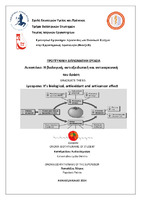| dc.contributor.advisor | Papalexis, Petros | |
| dc.contributor.author | Κατσόμαλλου, Λυδία Δήμητρα | |
| dc.date.accessioned | 2024-04-02T08:37:34Z | |
| dc.date.available | 2024-04-02T08:37:34Z | |
| dc.date.issued | 2024-04-01 | |
| dc.identifier.uri | https://polynoe.lib.uniwa.gr/xmlui/handle/11400/6318 | |
| dc.identifier.uri | http://dx.doi.org/10.26265/polynoe-6154 | |
| dc.description.abstract | Το λυκοπένιο ανήκει στην οικογένεια των καροτενοειδών έχοντας ισχυρή αντιοξειδωτική δράση, μόλις διπλάσια του β-καροτένιου και δεκαπλάσια της α-τοκοφερόλης. Καθώς ο άνθρωπος δεν μπορεί να βιοσυνθέσει τα καροτενοειδή, η πρόσληψή τους γίνεται αποκλειστικά δια μέσου της τροφής. Το λυκοπένιο προσδίδει το χαρακτηριστικό κόκκινο χρώμα στα φρούτα και στα λαχανικά, στα οποία περιέχεται, μεταξύ των οποίων η ντομάτα και τα παράγωγά της αποτελούν την κύρια πηγή πρόσληψης λυκοπενίου στον άνθρωπο.
Σκοπός της παρούσας εργασίας είναι, να επιδείξει τις ευεργετικές ιδιότητες του λυκοπενίου ως αντιοξειδωτική και αντιφλεγμονώδη ουσία και την επίδρασή του στην υγεία και κυρίως στα καρδιαγγειακά νοσήματα και στον καρκίνο, αναλύοντας δεδομένα από την υπάρχουσα βιβλιογραφία. Συγκεκριμένα, η πρόσληψη λυκοπενίου στις περισσότερες περιπτώσεις μειώνει τις αρνητικές επιπτώσεις που προκαλούν οι οξυγονούχες δραστικές ενώσεις (ROS), βελτιώνει την ενδοεπιθηλιακή λειτουργία και ελαττώνει τους παράγοντες κινδύνου των καρδιακών παθήσεων (οξειδωμένη-LDL, CRP, χοληστερόλη, αρτηριακή πίεση). Αναφορικά με το ρόλο του λυκοπενίου στην καρκινογένεση και στους πιθανούς αντικαρκινικούς μηχανισμούς, περιλαμβάνεται η προστασία του DNA από βλάβες που προκαλούνται από εξωγενείς παράγοντες (οξειδωτικό στρες, ακτινοβολία), η ρύθμιση του κυτταρικού κύκλου, η ενίσχυση του αποπτωτικού μηχανισμού και η αλληλεπίδραση με τα μονοπάτια σηματοδότησης και επικοινωνίας μεταξύ των κυττάρων. Τα αποτελέσματα των περισσότερων in vitro και in vivo ερευνών καθώς και των επιδημιολογικών μελετών, έδειξαν θετική συσχέτιση του λυκοπενίου με την υγεία. Ωστόσο, το πόρισμα ορισμένων κλινικών δοκιμών και κάποιων ερευνών μετα-ανάλυσης απέτυχαν να εντοπίσουν θετική επίδραση του λυκοπενίου στην υγεία. Συμπερασματικά, προκειμένου να αποδειχθούν οι ωφέλιμες βιολογικές δράσεις του λυκοπενίου στην υγεία απαιτείται η εκπόνηση καλύτερα σχεδιασμένων μελετών, που θα συλλέξουν δεδομένα μεγαλύτερης κλίμακας πληθυσμού. | el |
| dc.format.extent | 80 | el |
| dc.language.iso | el | el |
| dc.publisher | Πανεπιστήμιο Δυτικής Αττικής | el |
| dc.rights | Αναφορά Δημιουργού - Μη Εμπορική Χρήση - Παρόμοια Διανομή 4.0 Διεθνές | * |
| dc.rights | Attribution-NonCommercial-NoDerivatives 4.0 Διεθνές | * |
| dc.rights.uri | http://creativecommons.org/licenses/by-nc-nd/4.0/ | * |
| dc.subject | Λυκοπένιο | el |
| dc.subject | Καροτενοειδή | el |
| dc.subject | Ντομάτα | el |
| dc.subject | Οξειδωτικό στρες | el |
| dc.subject | Αντιφλεγμονώδης δράση | el |
| dc.subject | Καρδιαγγειακά νοσήματα | el |
| dc.subject | Αντιοξειδωτικό | el |
| dc.subject | Καρκίνος | el |
| dc.subject | Κλινικές δοκιμές | el |
| dc.subject | Υγεία | el |
| dc.title | Λυκοπένιο: Η βιολογική, αντιοξειδωτική και αντικαρκινική του δράση | el |
| dc.title.alternative | Lycopene: It’s biological, antioxidant and anticancer effect | el |
| dc.type | Πτυχιακή εργασία | el |
| dc.contributor.committee | Χανιώτης, Δημήτριος | |
| dc.contributor.committee | Τράπαλη, Μαρία | |
| dc.contributor.faculty | Σχολή Επιστημών Υγείας & Πρόνοιας | el |
| dc.contributor.department | Τμήμα Βιοϊατρικών Επιστημών | el |
| dc.description.abstracttranslated | Lycopene is a member of the carotenoid family and possesses a potent antioxidant activity, which is twice as strong as beta-carotene and ten times as strong as alpha-tocopherol. Humans are unable to produce carotenoids naturally, therefore they can only obtain them by consuming food. Lycopene imparts the distinctive red hue to the fruits and vegetables in which it is found, with tomatoes and their byproducts serving as the primary source of lycopene consumption in humans. The objective of this study is to showcase the beneficial characteristics of lycopene as an antioxidant and anti-inflammatory compound, as well as its impact on health, particularly in relation to cardiovascular illnesses and cancer. This will be achieved through the analysis of data obtained from current literature. More precisely, the consumption of lycopene generally mitigates the detrimental impacts induced by reac-tive oxygen species (ROS) that contain oxygen, enhances the functioning of the inner layer of cells, and diminishes the risk factors associated with heart disease, such as oxidized-LDL, CRP, cholesterol and blood pressure. Lycopene plays a role in carcinogenesis by protecting DNA from damage caused by external factors such as oxidative stress and radiation. It also regulates the cell cycle, enhances the apoptotic mechanism, and interacts with signalling pathways and cell-cell communication, potentially contributing to its anti-cancer effects. The findings of the majority of in vitro and in vivo studies, as well as epidemiological studies, have positively correlated lycopene with health. However, the findings of certain clinical trials and some meta-analyses failed to identify a positive effect of lycopene on health. In conclusion, in order to demonstrate the beneficial biological actions of lycopene on health, it is necessary to conduct better-designed studies that will collect data on a larger scale population. | el |


